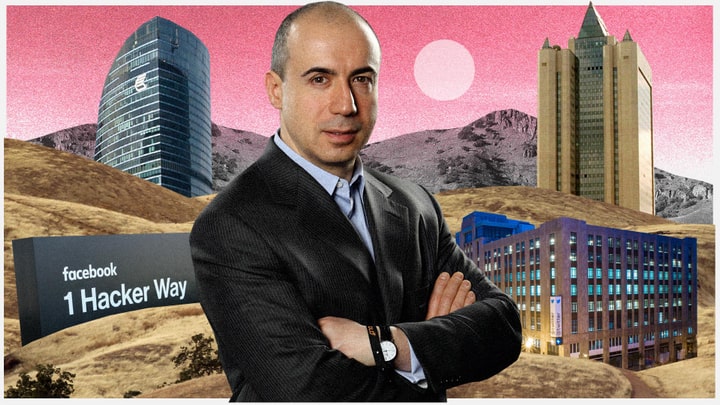From Moscow with Love
When the Russian billionaire Yuri Milner addressed an audience from the stage of a tech conference in the fall of 2010, he was more than willing to answer their questions at length. One of the industry's most prominent figures, Milner enjoys talking about his investments in companies like Facebook, Twitter and Airbnb, not to mention his new space project. But there is one thing he doesn’t like talking about: His financial backers. That distaste was on full display at the tech conference as well, when a reporter repeatedly asked Milner who was behind his investment in Facebook. The billionaire merely looked back and forth between the audience and the moderator as if he hadn't fully understood the question.
Thanks to the Paradise Papers, an answer is now forthcoming. The leaked documents show that companies controlled by the Kremlin invested hundreds of millions of dollars in Facebook and Twitter – with Milner's help. The documents prove that Russia’s VTB Bank, which has a reputation for being Russian President Vladimir Putin's personal slush fund, provided Milner in 2011 with at least some of the money for his stake in Twitter. The contribution was shrouded by offshore companies. Milner's 2009 investment in Facebook, meanwhile, was backed by another shell firm, some of whose capital came from the Russian energy giant Gazprom.
For a time, Milner’s companies owned more than 8 percent of Facebook and around 5 percent of Twitter, earning him a reputation as a star investor. He still enjoys this stature today, even though he has since sold his shares and reinvested them in a real estate fund partly owned by Jared Kushner, the son-in-law of United States President Donald Trump.
Just days after reporters from the New York Times confronted Milner with information from the Paradise Papers several weeks ago, an interview with him appeared on the website of the American business magazine Forbes. It marked the first time Milner had spoken out about the investments from Russia. His message: He wasn't an oligarch or a puppet of Moscow. Rather, he was a tech guru, a philanthropist and a visionary, the kind that only exists in Silicon Valley. And besides, Russia? He hadn't been there in three, maybe four years, he told Forbes.
Moscow could hardly be more different than the world in which Yuri Milner has established himself in Silicon Valley. His house alone, an estate south of Palo Alto located just a couple of miles from the headquarters of Facebook and Google, is said to have cost $100 million. There, he receives Hollywood stars like Keira Knightley – when he's not planning space missions with world-renowned physicist Stephen Hawking.

Stuart C. Wilson/Getty Images
The world in which Milner grew up was far less glamorous. He studied theoretical physics in his hometown of Moscow in the 1980s and sold gray-market computers on the side. After the collapse of the Soviet Union, he attended business school in the U.S. and then went on to work for the World Bank as a specialist for the Russian financial market. Armed with this newfound knowledge, he returned to Moscow and worked for a bank that eventually became insolvent. His first successful project was the restructuring of a pasta factory.
Then he discovered the internet. Milner took over the email service Mail.ru, kept it alive during the bursting of the dot-com bubble and then built it into one of the most important technology firms in Russia. He earned billions and took Mail.ru public on the London Stock Exchange in 2010. Previously, he had also founded the investment company Digital Sky Technologies (DST). One of his earliest supporters and business partners was the Putin confidant and oligarch Alisher Usmanov, with whom he held his 8 percent stake in Facebook through DST.
Four days after Facebook went public in 2012, DST sold its share package for close to $1 billion. It was a legendary deal, one that people in Silicon Valley still talk about today.
Largely unknown at the time was the fact that these shares had belonged to an obscure offshore company named Kanton Services, financed by the investment subsidiary of the state-owned Russian energy group Gazprom. Together with David Zweighaft, a respected forensic accountant, reporters belonging to the International Consortium of Investigative Journalists (ICIJ) evaluated relevant documents from the Paradise Papers. They came to the conclusion that Kanton had been financed by Gazprom.
It did so by engaging in transactions with subsidiaries of Milner’s company DST. That allowed Gazprom to move money without its role being exposed. Documents from the Panama Papers, the data trove obtained from the Panamanian law firm Mossack Fonseca that made headlines in 2016, showed that Kanton Services received $197 million in loans from Gazprom Investholding just three months before Facebook announced Milner's first investment in the company. In response to ICIJ inquiries, the Gazprom investment subsidiary said the loans to the offshore company Kanton Services “were provided for general corporate purposes.”
But the former director for Russia on the White House National Security Council, Michael Carpenter, isn’t convinced. "Kremlin-connected institutions make investments with strategic interests in mind – not just commercial interest but state interests as well,” he told the New York Times, which also participated in the Paradise Papers project. Facebook emphasized that DST had never used its stake to exert control over the company. "It is worth noting that as a passive investor, DST themselves had no voting rights or board seat," Facebook said in a statement. All the same, the suspicion that the social media giant concealed direct or indirect investments from the Russian government comes at an inconvenient time.
In early November, Facebook Vice President Colin Stretch was summoned to appear at a U.S. Senate hearing. The senators wanted to know first-hand the degree to which Russian actors had used social media to interfere in the presidential election campaign between Donald Trump and Hillary Clinton. Some 126 million Americans are said to have seen deliberate Russian disinformation on Facebook alone. To that end, Democratic Senator Al Franken asked: "How did Facebook, which prides itself on being able to process billions of data points ... somehow not make the connection that electoral ads paid for in rubles were coming from Russia?"
The query about Russian money made the Facebook representative visibly uncomfortable. Back when Milner bought his stake in the company in 2009, of course, it was by no means clear just how explosive the issue would eventually become. Only now have questions become more pressing given the concerns surrounding the Trump campaign’s potential connections to Russia. When Milner invested the first $200 million in Facebook, relations between the Kremlin and Washington were considerably more relaxed than they are now. The Obama administration had sought to create a climate specifically aimed at luring Russian investors to the U.S. That same year, then-Russian President Dmitry Medvedev visited Apple's Cupertino headquarters. Medvedev also set up a presidential commission for innovation, to which Milner belonged.

ITAR-TASS/imago
Milner's investments in Facebook and Twitter would likely not be possible today. After Russia's annexation of Crimea in 2014, VTB Bank and Gazprom – both essentially state-sponsored investors – were slapped with U.S. sanctions.
Even the $400 million Milner invested in Twitter in 2011 flowed through multiple channels. His company, DST, founded an offshore fund on the Isle of Man named "DST Investments 3," in which VTB Bank invested $191 million in July 2011. The Isle of Man-based fund financed around half of Milner's Twitter shares – meaning that millions of dollars from Russia's second-largest bank, a financial institution surrounded by controversy, were converted into shares of an American social media platform. The offshore company Kanton Services, which was involved in Milner's Facebook deal, also received shares in the DST fund on the Isle of Man, according to the documents – even though the company hardly paid any money into the fund. A curious state of affairs.
Did Kanton – which, according to the analyzed documents, was financed by the state-owned Gazprombank – receive shares from the DST fund from another state-owned bank, just like that? And who owns Kanton Services anyhow?
There is evidence of numerous links to Milner's backer, the oligarch Alisher Usmanov. Two of Usmanov’s business partners were involved Kanton Services, one as owner and the other as director, according to a memo from the law firm Appleby and documents from the Panama Papers. A trust company that administers many of Usmanov's firms referred to Kanton Services in an email as a "private investment company, (facebook and twitter)."
A spokesperson for Usmanov told the New York Times that the oligarch was not dependent on public sources of money for his investments. Usmanov, he said, “did not borrow from or use state or quasi-state funds to make investments in Facebook.”

Glyn Kirk/AFP
Whether Kanton Services belonged to Usmanov or not, the company acquired much of the DST stake, which had previously belonged to VTB Bank, in 2014, just a few months after Twitter's initial public offering. A spokesperson for Milner's company declined to provide information about agreements between VTB Bank and Kanton Services.
Yuri Milner sought to distance his company from Usmanov in comments to the New York Times. He said there were many sources of financing and it would be impossible to know whether money from the Gazprom subsidiary was used to finance his company's stake in Facebook.
To drive home his point, Milner placed three clear plastic cups filled with green M&Ms in front of him, each of which was labeled: There was "Mr. Usmanov," "Facebook" and "Alleged Russian government funds." Then he began shifting the contents of one cup into the next. "Money is fungible," he said. "You can’t just say that this specific dollar went all the way to Facebook."
For Yuri Milner, it’s all quite simple anyway. It’s “nothing more than business,” he told the New York Times. “We are getting money, and we are putting them in Facebook and Twitter. We are making money for our limited partners, and we are giving money back to them. For me, it’s a commercial arrangement.”
Plus, he has long since changed focus. The headline of his recent interview with Forbes magazine, “Moving On From Russia,” wasn’t likely chosen at random. Milner’s message was clear: His Russian partners belong to the past.

